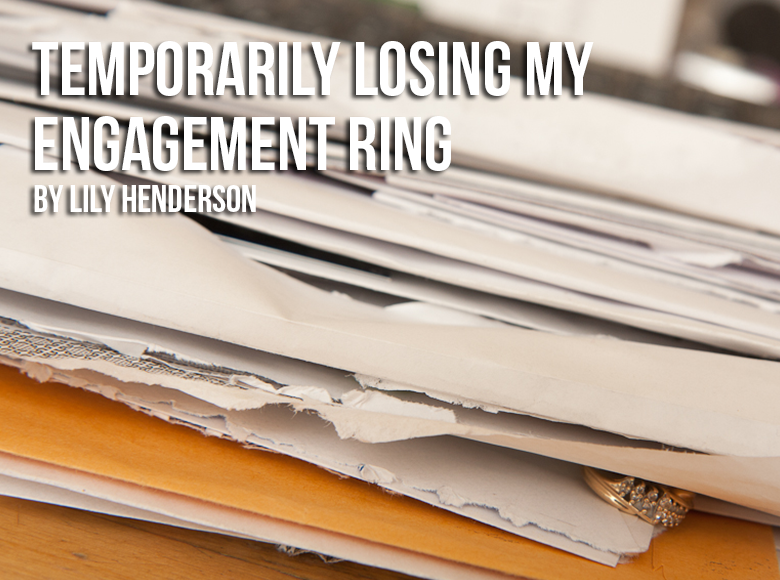So here I am, sobbing in the airport. I hate this for many reasons. See, I’ve just realized that I am not wearing my engagement ring, and I must have run out the door of my hotel room without it. My perfect, vintage, sapphire ring was gone. The one that I picked out with my partner to mark the moment when we decided to throw caution to the wind and get hitched despite a murky and unpredictable future. The ring that followed us through three cross-country moves, two years of long distance, multiple new homes.
I’m trying as hard as I can to stop the flow of tears, because not only am I distraught that I could be so careless as to lose this unbelievably important symbol in my life, I am angry at how frantic I look to strangers. How they can see I’m falling apart, how they will judge this enormous character flaw, and how I am the dumb girl who lost something so important.
Sitting in the bathroom, holding my breath so that other people can’t hear my crying, I give myself a silent pep talk. “Come on, Lily. Get your shit together. There are things you need to do before you get on that plane to increase your chances of finding that ring.” I squeeze my fists tightly and take three deep breaths, using my anger to push down the sadness and regret and dizzying irresponsibility so I can call the hotel.
I was passed from staff member to staff member, as the hotel struggled to help me deal with the situation. My voice cracks and theirs soften. “Oh honey, where were you in the hotel? Where can we check for you?” I am so thankful for their kindness, and so embarrassed at my carelessness. I call my roommate from the conference, and ask her to check around the room, see if she sees the glint of metal. I am angry for inconveniencing her this morning. She comforts me, “We’ll find it.” I call the cab driver who took me to the airport—nothing. I call and call and call, no result after no result. I am shaking, my eyes are rimmed with tears, my voice is far from steady, and I feel like people are watching me. Watching me fall apart.
I call my mom and she gives me suggestions for where else to look and how to calm down. She is so zen in situations like this. She suggests sitting and breathing because, now that I’m past security, there isn’t much else for me to do but wait to see if any one of my taskforce will find it.
On the plane, I am thankfully seated in a row by myself, and now that I am not allowed to make any calls, the weight starts to really sink in and I totally lose control. Because it’s a short flight, I don’t have to interact with flight attendants or other passengers, so I completely lose my composure and just cry and cry and cry, wishing that I had been more careful, angry that I had to inconvenience so many people, upset because I am never this way.
I reach into my pocket for a tissue—and there it is. In my pocket! Who is this crazy person, who not only could lose it in the first place, but the usually cool-headed Lily Henderson could forget to check her own pocket?! We land and I call the hotel to let them know that I’ve found it, and am hit with a warm wave of relief and joy as it comes through the phone. I was completely unprepared for these strangers to react with such kindness—not only at the ring being lost, but to celebrate with me once it was found. Humanity is inspiring, folks. The same thing happens when I text my conference roommate—pure joy that the dilemma is solved. I don’t know what I was expecting—contempt, maybe? But it turns out that everyone I asked not only took time to help me, but continued to show compassion once my situation had been righted. Even though they all had better things to do.
For me, this was an exhausting but effective lesson in human kindness and in letting myself off the hook. I am a known perfectionist and have an extremely hard time asking for help because I don’t want to inconvenience people, and I don’t want to look like I don’t care. What an enlightening situation where I not only was forced to ask for help fixing my mistake, but I also found that even when I was totally inconveniencing others and making a fool out of myself, both my friends and strangers took care of me in ways that I didn’t even know I needed. And in the end, everything worked out.
This made me really reconsider how I structure my thinking around mistakes. When I do something utterly stupid (and everyone does, right? Right?), what if I have the opportunity to choose between digging myself into a shame spiral of regret and anger while furiously fixing the problem alone, or reaching out to a caring community? Why would I ever pick the first? Yes, I risk being seen as dumb, but isn’t it better to be seen as human and then able to see other people’s love?
So, thank you, universe, for the strange, painful, effective and ultimately low-risk opportunity to learn about letting yourself be seen. Because there are people who might surprise you with their kindness, and I don’t want to miss out on knowing them.

Photo by Andy Sutterfield
